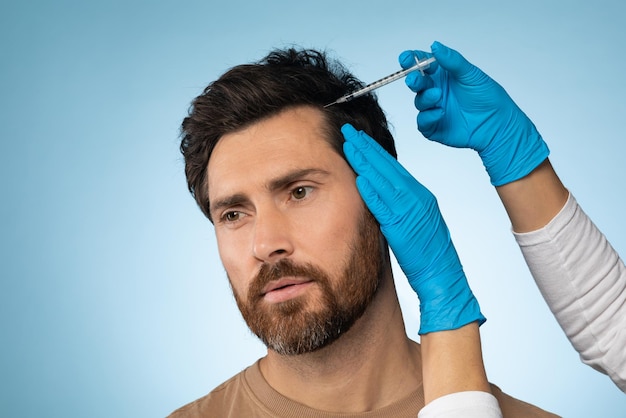Who is a Good Candidate for PRP Hair Therapy?

Platelet-Rich Plasma (PRP) therapy has gained significant attention as an innovative treatment for hair loss and thinning. This minimally invasive procedure uses the patient’s own blood to stimulate hair growth and improve hair density. However, not everyone is an ideal candidate for PRP therapy. Identifying the right candidates is crucial for achieving optimal results. This comprehensive article explores the characteristics that make someone a good candidate for PRP In Dubai.
Understanding PRP Hair Therapy:
What is PRP Hair Therapy?
PRP hair therapy involves drawing a small amount of the patient’s blood, processing it to concentrate the platelets, and then injecting the platelet-rich plasma into the scalp. Platelets are rich in growth factors that promote tissue repair and regeneration, making PRP an effective treatment for stimulating hair follicles and encouraging hair growth.
How Does PRP Work for Hair Loss?
The growth factors in PRP help to:
- Stimulate Hair Follicles: PRP activates dormant hair follicles, encouraging them to enter the growth phase.
- Increase Blood Supply: Enhanced blood flow to the hair follicles provides essential nutrients and oxygen, promoting healthier hair growth.
- Reduce Inflammation: PRP has anti-inflammatory properties that can help reduce follicular inflammation, which is often associated with hair loss.
Characteristics of a Good Candidate for PRP Hair Therapy:
Early Stages of Hair Loss
- Mild to Moderate Hair Thinning: Individuals experiencing early stages of hair thinning or mild to moderate hair loss are ideal candidates. PRP is most effective when there are still active hair follicles that can be stimulated.
- Recent Hair Loss: Those who have noticed hair loss within the past few years tend to respond better to PRP therapy. Early intervention can prevent further hair loss and promote regrowth.
Overall Health
- Good General Health: Candidates should be in good overall health. Chronic illnesses, severe medical conditions, or infections can affect the efficacy of PRP therapy.
- Non-Smokers: Smoking can impair blood circulation and reduce the effectiveness of PRP. Non-smokers or those willing to quit smoking during the treatment period are better candidates.
Scalp Condition
- Healthy Scalp: A healthy scalp free from infections, inflammation, or severe dandruff is essential for PRP therapy. Conditions like psoriasis or eczema should be treated before undergoing PRP.
- No Active Infections: Candidates should not have any active scalp infections or open wounds at the time of treatment.
Hair Type and Quality
- Existing Hair Follicles: PRP therapy is most effective when there are still active hair follicles present. It may not be suitable for individuals with extensive baldness or areas where hair follicles have completely disappeared.
- Hair Quality: Individuals with fine or thinning hair can benefit significantly from PRP, as it can improve hair thickness and density.
Realistic Expectations
- Understanding PRP Limitations: Candidates should have realistic expectations about the results. PRP therapy can improve hair density and slow down hair loss, but it may not completely restore a full head of hair.
- Commitment to Multiple Sessions: PRP therapy typically requires multiple sessions for optimal results. Candidates should be willing to commit to the recommended treatment plan, which may involve several sessions spaced a few weeks apart.
Age Factors
- Adults: PRP therapy is suitable for adults of various ages. However, younger individuals experiencing early hair loss may see more pronounced results due to the presence of more active hair follicles.
- Middle-Aged Individuals: Middle-aged individuals experiencing age-related hair thinning can also benefit from PRP, as it can help maintain hair density and slow down the progression of hair loss.
Exclusion Criteria
- Medical Conditions: Individuals with certain medical conditions, such as platelet disorders, chronic liver disease, or severe anemia, may not be suitable candidates for PRP therapy.
- Medications: Some medications, such as blood thinners, can affect the efficacy of PRP. Candidates should disclose all medications they are taking to their healthcare provider.
- Pregnancy and Breastfeeding: Pregnant or breastfeeding women are typically advised to avoid PRP therapy due to the lack of research on its safety in these populations.
Consultation and Evaluation:
Professional Assessment
- Consultation with a Specialist: A thorough consultation with a dermatologist or hair restoration specialist is essential. The specialist will evaluate the patient’s medical history, scalp condition, and hair loss pattern to determine suitability for PRP therapy.
- Diagnostic Tests: In some cases, diagnostic tests such as blood tests or scalp biopsies may be conducted to rule out underlying conditions contributing to hair loss.
Personalized Treatment Plan
- Customized Approach: Based on the assessment, the specialist will develop a personalized treatment plan tailored to the patient’s specific needs and goals.
- Combination Therapies: PRP therapy can be combined with other treatments, such as microneedling, laser therapy, or topical medications, for enhanced results.
Conclusion!
PRP hair therapy offers a promising solution for individuals experiencing hair thinning and early stages of hair loss. Identifying the right candidates is crucial for achieving optimal results. Good candidates for PRP therapy are those in the early stages of hair loss, in good overall health, with a healthy scalp, and realistic expectations. A thorough consultation with a specialist is essential to determine suitability and develop a personalized treatment plan. By understanding the characteristics of a good candidate, individuals can make informed decisions and embark on a successful journey toward hair restoration with PRP therapy.









